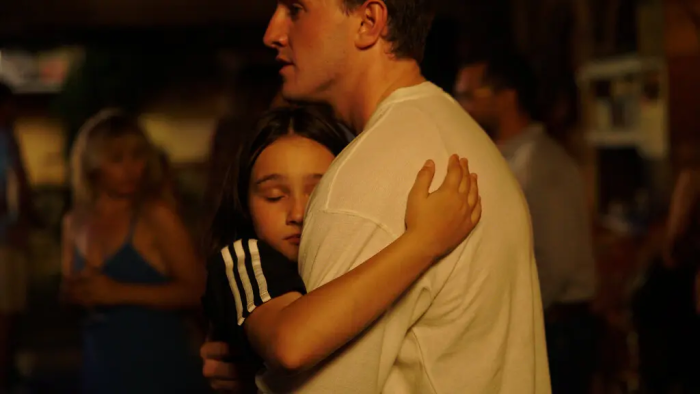What happens when the camera stops? Or the polaroid finishes developing?
These are the questions Aftersun (2022) is primarily concerned with; the exact place where moments end and memories begin. It’s a film about distance and longing, or more specifically attempting to reconcile the past and the present, but to what success?
The film follows father Calum (Paul Mescal) and daughter Sophie (Frankie Corio) on a cheap holiday in Turkey during the 90s, but the holiday is remembered through the perspective of an older Sophie who is around the same age as her father was during the film’s time frame. Both father and daughter are mirror images of each other, as Calum is struggling with the financial and personal pressures of his life as he gets older, but attempts to keep these difficulties a secret from his daughter, and Sophie is entering her teenage years, just beginning to encounter the growing pains that come with it.
Mescal plays Calum with a gentle and sensitive nature. His performance is simple, but Mescal still hints at the hidden complexities of his character with careful control. As for Corio, in her debut acting role she portrays Sophie with a precocious and intelligent flair. Corio captures both the naive and thoughtful aspects of her character with great intuition and wit.

Aftersun marks the feature film directorial debut of Scottish film-maker Charlotte Wells. For a debut such as this, the film demonstrates a remarkable sense of certainty. Wells is assured in the tone she wants to set for the film and never drifts too far from it. The film feels both empty and full, yet lively and still, all at once. She also isn’t committed to providing the audience with complete answers, as the camera cuts out the parts that Sophie’s own memory cannot remember. The film is a mystery, as Sophie tries to pair the father she knew with the person she didn’t- like picking up fragments of a person and putting them together, while having to accept that the last piece of the puzzle might be lost forever.
The film is a dual narrative for a past and present Sophie. It cuts between the two versions of her with uncertainty, with older Sophie often viewing her father in dark and flashing night club scenes that leaves the viewer both disorientated and unbalanced. Wells mixes the old with the new continuously: the digital camera with the handheld camcorder, and the videos of Calum watching younger Sophie placed alongside older Sophie watching her own recordings of her dad. Filming one another or more precisely the process of ‘film-making’ itself becomes more than the want to remember something, and instead becomes a love language between the pair, in which they can communicate things that would otherwise be left unsaid.
It isn’t just a study of memory and how exactly we remember things. It’s also about what becomes of those memories when we walk away. Wells is aware, as a film-maker, of the process that is required of putting her mind, and the people that preoccupy it into a fixture- life becomes more fragile outside the frame, it’s less controlled. She wants to show the distinction between the instants of frozen time we choose to record, as opposed to the quiet moments we spend reliving those moments. But the irony is, even those moments of forced realism and silence co-exist in the world of her film.

Shots flicker with beautiful imagery. Sometimes it’s just the depiction of father and daughter drifting on a float with the waves crashing, or one of a dark image running onto the beach that leaves an impression. Most shots are still-life paintings, but the integration of the home video footage offsets this, in time to remind us that everything is just a memory, an inconsistent fragmentation. Like T.S Elliot referred to the ‘still point of the turning world’, Aftersun is itself a contradiction. As soon as it settles on one thing, it moves to the other side.
Calum and Sophie are this contradiction too. Their moments of closeness and understanding are shifted by separation and dismissal. Aftersun itself is about the mystery of those close to us, how they can give us hints, clues even, but we’ll never really know them exactly as they are. Our eyes are the camera, they frame them the exact way we set the lens.
Aftersun is playing in UK cinemas from the 18 November.
